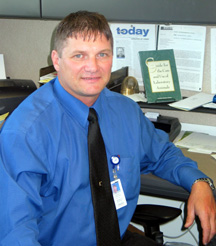 Joe Krajicek grew up around hogs and cattle on the family farm near 92nd and Q streets. Today, the Gretna resident is surrounded by mice and rats, which make up 99 percent of the 15,000 animals on the UNMC campus.
Joe Krajicek grew up around hogs and cattle on the family farm near 92nd and Q streets. Today, the Gretna resident is surrounded by mice and rats, which make up 99 percent of the 15,000 animals on the UNMC campus.
Krajicek, assistant director for operations for UNMC’s Comparative Medicine, has received the Chancellor’s Gold “U” Award for July for his leadership and commitment in caring for the animals used in UNMC’s research enterprise.
A division of the Office of the Vice Chancellor for Research, Comparative Medicine is responsible for the housing and care of all animals on campus. “We’re the animals’ advocate,” Krajicek said. “We watch over the animals to ensure their care is appropriate, facilitate research and follow all regulations and accreditation guidelines.”
|
|
“He always performs his duties with a most positive attitude and with genuine concern for both the animals and research staff members,” nominators said.
Much has changed since Krajicek joined UNMC in 1990. Then, there were less than 700 animals on campus. Today, the department works with approximately 100 different researchers who use 15,000 animals.
The opening of the Durham Research Center last fall provided the first new animal housing on campus since the late 1970s, Krajicek said. “When Chancellor (Harold M.) Maurer initially set goals for research we didn’t have the infrastructure in place to support these goals. Chancellor Maurer and Dr. Tom Rosenquist (vice chancellor for research) have been extremely supportive in making sure investigators have the facilities to do research. The state-of-the-art facilities we now have are competitive with any in this country.”
Krajicek began working in comparative medicine (previously named the animal resource facility, or ARF) as business manager. He graduated from Kearney State College (now the University of Nebraska at Kearney) with an agricultural business degree.
As the research animal population has grown, so, too, has the department. There were eight employees in the department in 1990. Today, there are 30, including two full-time veterinarians.
The level of care also has become more regulated. The U.S. Department of Agriculture conducts unannounced visits to ensure UNMC is in compliance with federal regulations. “People would be surprised to learn there are more regulations concerning animal care than for human patients in the hospital,” Krajicek said.
UNMC was one of the first (31st worldwide) to be accredited by the Association for Assessment and Accreditation of Laboratory Animal Care (AAALAC). “It’s quite a distinction,” Krajicek said. “It shows the medical center is committed to quality animal care.” In Nebraska, UNMC and the VA Medical Center are the only AAALAC accredited institutions.
“My schedule is dictated by research and animals,” Krajicek said. “It’s a jigsaw puzzle making sure all the pieces fit, but my staff is very conscientious of what they do. My job is made a lot easier thanks to the leadership of Dr. Robert Dixon (director of comparative medicine). He is the reason that comparative medicine can accomplish what it does.”
Behind secured walls, comparative medicine employees do all of the feeding, watering, and cage changing, cleaning and autoclaving or sterilizing. Corn-cob bedding material inside the cages must be changed regularly and cages are opened under biosafety cabinets so animals are not exposed to undesirable pathogens. The animal’s water is purified and their feed is sterilized or irradiated. Their cages also are sterilized regularly with temperatures that reach 270 degrees Fahrenheit.
These are not your typical mice. “Your pet mouse at home would make a poor research subject,” Krajicek quipped.
The department purchases all of UNMC’s research animals from approved vendors whose purpose is to raise and breed animals for research. Many are transgenic mice, which means they have a gene added or modified for research purposes. The department also arranges for delivery of the animals.
It’s a round-the-clock operation, Krajicek said. “We constantly have to be on the alert. Each day, situations arise that require immediate action to ensure appropriate care of the animals,” he said.
A diseased animal cannot provide valid research data, so the team is vigilant in its care and treatment of the animals, some of which are valued at more than $100,000. Following a mouse hepatitis virus outbreak in 2001, UNMC has invested more than $2 million in new micro-isolaters, or clear, enclosed cages the size of a large shoebox and bigger.
During his tenure, Krajicek also has developed and taught a Laboratory Animal Technician Certification Course for UNMC personnel, recruited additional instructors and succeeded in obtaining animal care certification credentials for most members of the comparative medicine staff. Overall, he supervises 26 subordinate personnel.
Krajicek and his wife, Jeanne, have five children and one grandchild. He enjoys hunting, fishing and refereeing high school football games and wrestling matches.